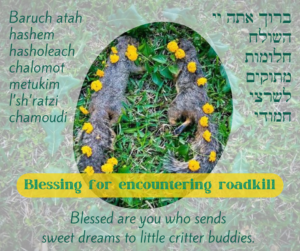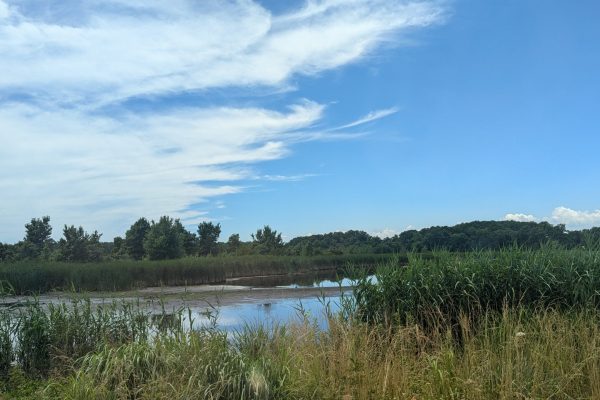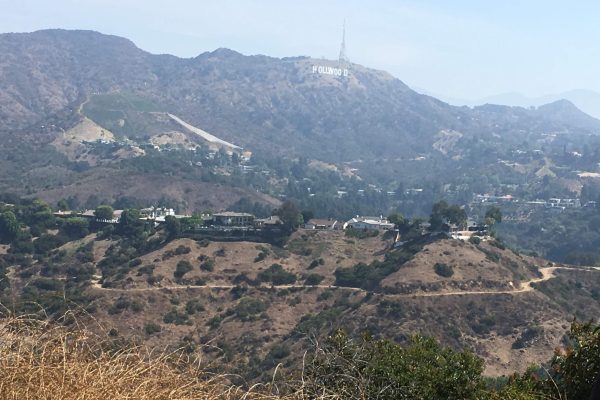There is not a Jewish ritual for encountering death in the form of dead animals, whether they died as roadkill or from other natural causes. We do not traditionally do mourning practices for animals, even beloved pets who live as members of our families. There are plenty of Jewish texts that speak to giving dignity to unclaimed dead bodies [met mitzvah] and not causing pain to animals [tza’ar ba’alei chayim]. This ritual is crafted with layers of possible responses depending on where and how you encounter the dead body.
My dear friend and Jewish songleader and teacher, Rachmiel Klein, wrote a beautiful song called “Lullaby for Roadkill.” The chorus of that song comes to mind every time I see a dead animal, and I wanted to use this song as a source text to craft a bracha [blessing] for this ritual.
Sweet dreams little critter buddy
Twitch your nose, slow down, get all muddy
Forget the twig shelter you built when it last snowed
Your precious life was a bump in the road
The song is able to hold the tenderness of life, the quotidian preciousness of animal life. It also marks our human distance from animal death, naming these beings as “critters” and reflecting how often their lives end as a stumbling block for our big-wheeled machines.
Ritual Guide
For when you encounter an animal body that you can tend to physically
Body Prep
Notice the body, take in the fact of death. If needed and if possible, gently move the body off the road or sidewalk into grass or another natural area. Take caution around potential pathogens and don’t touch the animal body with your bare hands. Perhaps arrange the limbs in a dignified manner or gently nudge the animal with a stick to move it to a safer place.
Homage to Tahara
We do not traditionally perform tahara [ritual purification of a dead body] for non-human animals. There is also some ecological agreement that we should not bury these animal bodies, as that disrupts the natural cycle of life and death and the food chain. This ritual component is instead an homage to the process of tahara, part of which is pouring water ritually over the body and naming the pureness of the person in front of you. For this animal body, pour water over it or near it and say “tahorah hee” [lit. “she is pure,” referring in this case to the animal by the grammatically feminine term nefesh chaya [Gen 1:24].
Kriah
Find a loose piece of natural detritus—a fallen leaf, a blade of grass, a twig.
Tear the natural material and recite the following:
| Blessed are you, our G?!d, sovereign of the world, the one true judge | Baruch atah hashem eloheinu melech ha’olam dayyan ha’emet | ברוך אתה יי אלהינו מלך העולם דיין האמת |
Let the pieces of nature fall away and return to the ground, recognizing the cycle of life and death in the plant and animal world.
Spontaneous Honor
Say any words that you’d like to share. A spontaneous blessing, a eulogy. Say goodbye. Share a poem on death or nature. Sing a nigun. Whatever feels right.
Closing
Recite this bracha:
| Blessed are you who sends sweet dreams to little critter buddies. | Baruch atah hashem hasholeach chalomot metukim l’sh’ratzi chamoudi | ברוך אתה יי השולח חלומות מתוקים לשרצי חמודי |
For when you encounter an animal body and have a moment to spare
Notice the body, take in the fact of death.
Kriah
Find a loose piece of natural detritus—a fallen leaf, a blade of grass, a twig.
Tear the natural material and recite the following:
| Blessed are you, our G?!d, sovereign of the world, the one true judge | Baruch atah hashem eloheinu melech ha’olam dayyan ha’emet | ברוך אתה יי אלהינו מלך העולם דיין האמת |
Let the pieces of nature fall away and return to the ground, recognizing the cycle of life and death in the plant and animal world.
Closing
Recite this bracha:
| Blessed are you who sends sweet dreams to little critter buddies. | Baruch atah hashem hasholeach chalomot metukim l’sh’ratzi chamoudi | ברוך אתה יי השולח חלומות מתוקים לשרצי חמודי |
For when you are driving and speed by an animal body
Notice the body, take in the fact of death. Recite this bracha:
| Blessed are you who sends sweet dreams to little critter buddies. | Baruch atah hashem hasholeach chalomot metukim l’sh’ratzi chamoudi | ברוך אתה יי השולח חלומות מתוקים לשרצי חמודי |












